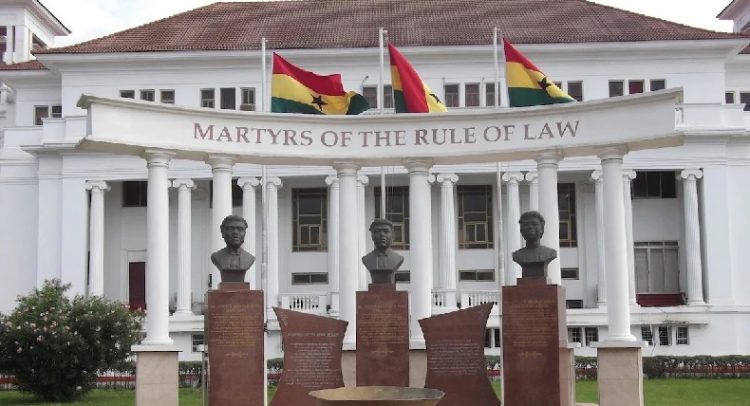The Supreme Court has set March 9, 2022, to give its judgment on whether a Deputy Speaker of Parliament who is presiding in the absence of the Speaker, can vote on issues before the House.
The issue has generated heated arguments in the public with commentators divided over whether a Deputy Speaker whilst presiding in the absence of the Speaker can participate in voting.
The Speaker of Parliament, Alban Bagbin, has for some time, been travelling abroad to seek medical review and in his stead, the First Deputy Speaker, Joe Osei-Owusu, whilst presiding over the passage of the 2022 budget, participated in the voting process, but the opposition NDC hit the rooftop, saying he could not have a vote.
A private legal practitioner and a law lecturer at the University of Professional Studies (UPSA), Justice Abdulai, subsequently went to the Apex Court seeking an interpretation of the law on the matter.
The lecturer, in his statement of case, contended that it was unconstitutional for the Deputy Speaker to have counted himself for the purpose of making up the quorum of half of the Members of Parliament (MPs) required by Article 104 (1), when Parliament approved the 2022 Budget and Economic Policy of Government on November 30, 2021.
The Attorney General, Godfred Yeboah Dame, in his submissions however, argued that a Deputy Speaker of Parliament or any member presiding over proceedings in the House in the absence of the Speaker, is entitled to be counted for the purpose of making up the quorum of half of the Members of Parliament (MPs) required by Article 104 (1) of the Constitution for the determination of matters in Parliament.
He said further that a Deputy Speaker or any member presiding over proceedings in the House in the absence of the Speaker is entitled to cast a vote for the purpose of taking a decision in the House in accordance with Article 104(1) of the Constitution.
Settled Issues
A seven-member panel of the court presided over by Justice Jones Dotse and assisted by Justices Nene Amegatcher, Prof. Nii Ashie Kotey, Mariama Owusu, Avril Lovelace Johnson, Clemence J. Honyenuga, and Yoni Kulendi, yesterday adopted three issues agreed upon by the parties for determination.
The court, however, struck out one other issue filed by the plaintiff on ground that the issue had not yet arisen.
Justice Abdulai told the court he did not have anything else to add to his submission filed before the court.
The Attorney General, however, referred the court to Article 97 clause 1 of the Constitution which states that “A member of Parliament shall vacate his seat in Parliament – (a) upon a dissolution of Parliament; or (b) if he is elected as Speaker of Parliament.”
He said a Deputy Speaker only vacates his seat when he is elected as Speaker.
The court subsequently set March 9, 2022 to give its judgment on the matter.
Writ
The plaintiff is further saying that to the extent that the Deputy Speaker cannot be counted, the decision taken on November 30, 2021 to approve the 2022 budget was a nullity.
Mr. Abdulai is therefore, seeking a declaration that, upon a true and proper interpretation of articles 102 and 104(1) of the 1992 Constitution, a Speaker or any other person presiding over Parliament cannot be said to be part of the members present for the purposes of decision making.
He also wants a declaration that upon a true and proper interpretation of articles 102 and 104(1), the First and Second Deputy Speakers when presiding over Parliament have the same authority as the Speaker of Parliament and can therefore not be counted as Members of Parliament present for the purposes of taking a decision in accordance with Article 104(1) of the 1992 Constitution, and consequently claimed a declaration that the decision taken on November 30, 2021 to approve the 2022 budget amounts to a nullity and is of no effect.
AG Case
The Attorney General however, disagrees with the plaintiff and argues that the view espoused by plaintiff suffers from a fundamental failure to distinguish between a “Speaker qua Speaker under the Constitution” and a “Member of Parliament who deputises for the Speaker” by virtue of articles 96 and 101.
Mr. Dame submitted further that the plaintiff relied only upon a very narrow, literal and absurd construction of articles 96, 101, 102 and 104 of the constitution and thereby, failed to take account of the different kinds of quorums required for the different “businesses” of Parliament and the rationale therefore, which supports the AG’s view that in so far as decision making in Parliament is concerned, all Members of Parliament including a Deputy Speaker when presiding, are entitled to vote.
On the different kinds of quorum established by the constitution, Mr. Dame submitted that “it is clear from Article 102, that, for the ordinary business of Parliament, there must be a quorum of only one-third of all the Members of Parliament,” adding “given that Parliament presently is made up of 275 members, the quorum required for the conduct of its business is 92 MPs. On the clear wording of the provision, the person presiding is not counted as part of the quorum.
The AG then invited the court to take particular account of the words “person presiding” in Article 102, and held that, when the constitution deliberately meant to specifically exclude a Deputy Speaker or any person who at a material point in time is performing the role of Speaker, from being included in the reckoning of any number for any purpose in Parliament, it said so in unambiguous terms.
BY Gibril Abdul Razak


